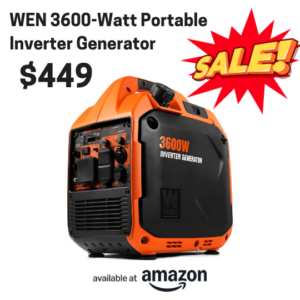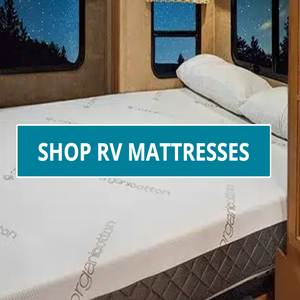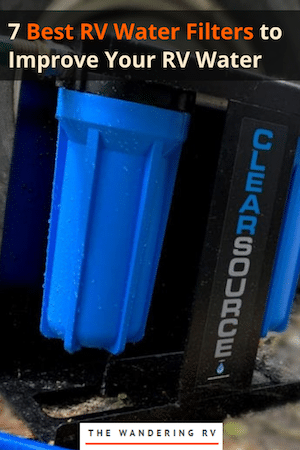
An RV water filter is important to ensure your water is clean and healthy.
Don’t be surprised to find microorganisms such as giardia and E.coli in water if you don’t have the right water filters.
That’s why it’s important to get the right information and avoid health problems.
There are a few key things to know about water filters to make the right choice about which one will do the job your RV needs.
Here’s your buyer’s guide for RV water filters, with answers to common questions and in-depth reviews:
Table of Contents
- Best RV Water Filters of 2023
- What Is an RV Water Filter?
- Types of RV Water Filtration Systems
- In-Depth RV Water Filtration System Reviews
- How to Choose an RV Water Filter
- FAQs
- Conclusion
Note: Some of the links in this article are affiliate links. This doesn’t cost you any more than normal. Read our disclaimer for more info.
Best RV Water Filters of 2023
Best Premium
CLEARSOURCE Premium RV Water Filter System
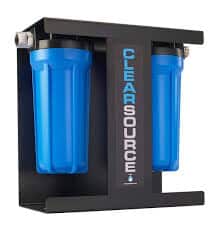
Summary
This product is a two-stage micron and carbon block filter that can last for about 2,000 gallons or three months. It is a heavy-duty filter that removes chlorine odor, large contaminants, and particles down to 0.5 microns.
Pros
- Perfect for removing giardia, small microns, and cysts
- Powdered stainless steel housing
- It’s excellent for large capacity and flow
Cons
- Slightly expensive
- Leaks if you do not tighten it well
Best RV inline Water Filter
Culligan RV-800
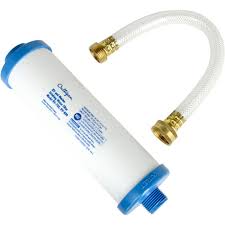
Summary
This option is an inline filter that has a lifespan of 3 months or 250 gallons. The great thing about this filter is that it is a light and affordable unit. Plus, it’s a level-one filter that is very easy to install.
Pros
- Great for seasonal use
- Five-year limited warranty
- Filters water before it enters the tank
- Affordable
Cons
- Does not filter out all types of bacteria
- Metal fittings can break
Best Replacement RV Water Filter
Neo-Pure KW1
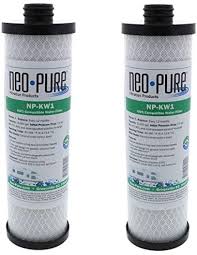
Summary
Its eco-friendly coconut shell carbon block will ensure that your water tastes fresh and does not have an unpleasant odor. It comes with a 5-micron sediment mesh, needs replacement every 10,000 gallons, and has a flow rate of 2.5 gallons per minute (GPM). It’s also affordable. The great thing about this filter is that we could not find any downsides to it. It is perfect if you want the complete package.
Pros
- Compatible with RC housings
- Double O-rings ensure leak-free sealing
- Thick walls prolong its life
- 5-micron mesh removes fine rust and sediments
Cons
- No significant drawbacks to this product to point out!
What Is an RV Water Filter?
The easiest way to describe a water filter is that it is a device that works to ensure there are no microorganisms in your water once it reaches your faucet. It also works to remove the strong odor that microorganisms carry when they are in the tank.
In other words, it is a filtration system that gets rid of contaminants and eliminates sediment from water that you pump into your RV. It also improves the taste of the water by removing deposits and reducing chlorine. By eliminating microorganisms, water filters help prevent your appliances from clogging and damaging.
A water filter is also an affordable, eco-friendly alternative to purchasing bottled water. It gets rid of any lead in the water from old and corroded pipelines. You can also get an ultraviolet system, which helps to make untreated water sources potable.
Getting an RV water filter is essential to drink clean, fresh water that tastes good. Not only do you need water filters, but they must also be changed regularly and before their effectiveness fades.
Also, make sure that you have the right filtration system for what you need to use water. Preferably, you want to install a filtration system that will provide you full capacity for your family so that everyone can shower, drink, and clean.
Related Post — https://www.thewanderingrv.com/rv-accessories/
Best Premium
CLEARSOURCE Premium RV Water Filter System

This product is a two-stage micron and carbon block filter that can last for about 2,000 gallons or three months. It is a heavy-duty filter that removes chlorine odor, large contaminants, and particles down to 0.5 microns.
Pros
- Perfect for removing giardia, small microns, and cysts
-
Powdered stainless steel housing
-
It’s excellent for large capacity and flow
Cons
- Slightly expensive
- Leaks if you do not tighten it well
Best Inline
Culligan RV-800

This option is an inline filter that has a lifespan of 3 months or 250 gallons. The great thing about this filter is that it is a light and affordable unit. Plus, it’s a level-one filter that is very easy to install.
Pros
- Great for seasonal use
- Five-year limited warranty
- Filters water before it enters the tank
Cons
- Does not filter out all types of bacteria
- Metal fittings can break
Best Replacement
Neo-Pure KW1

Its eco-friendly coconut shell carbon block will ensure that your water tastes fresh and does not have an unpleasant odor. It comes with a 5-micron sediment mesh, needs replacement every 10,000 gallons, and has a flow rate of 2.5 gallons per minute (GPM). It’s also affordable. The great thing about this filter is that we could not find any downsides to it. It is perfect if you want the complete package.Compatible with RC housings Double O-rings ensure leak-free sealing Thick walls prolong its life 5-micron mesh removes fine rust and sediments
Pros
- Compatible with RC housings
-
Double O-rings ensure leak-free sealing
-
Thick walls prolong its life
-
5-micron mesh removes fine rust and sediments
Cons
- No significant drawbacks to this product to point out!
Types of RV Water Filtration Systems
There are a few things to consider when selecting the type of filtration system for your RV. Essential factors to consider are the frequency of use, desired level of water, and the contaminants you’ve got in your tank. Based on this information, you can decide which type of RV water filter is best or which combination of filters can provide your RV with stellar filtration performance.
Carbon Filters
This system is very common in many RVs. One of the biggest reasons why is that it improves the taste and odor of the water. Through absorption, carbon filters remove chlorine chloramines and eliminate herbicides and volatile organic compounds.
While carbon filters work to improve the smell and taste of your water, you need to make sure that your water source does not have heavy sediment or pathogenic bacteria so that you can get the best results from carbon filters.
Sediment Filters
If you want an extra layer of protection, you will find sediment filters to be a delight. These filters work extra hard to remove dirt and debris from your RV’s water. Sediment filters also make your other filters more durable by protecting them as well as your plumbing.
Sediment filters complement carbon ones, which need to be changed frequently. Also, sediment filters help UV purification as dirt particles would prevent UV light from disinfecting the water. Unless you can always connect to municipality water sources, having sediment filters is essential.
If you do not install these filters and have sediments in your RV, you may notice your water is dirty and has an unpleasant taste. Besides causing damage to your health, sediments can also cause damage to your shower and faucets by clogging pipelines and reducing water pressure.
Ultraviolet Purification
If you suspect that your RV contains bacteria or viruses, then ultraviolet purification will be the best option for you. It exposes bacteria to disinfecting ultraviolet wavelengths.
UV lamps prevent bacteria from reproducing by using radiation, ensuring that it does not get into your drinking water. A UV system works well if you travel with your RV to places where the water quality is questionable. The great thing about a UV purification system is that you can purify water even if you have not used it in a while.
Remember that ultraviolet purification does not improve the water’s taste—its primary purpose is to sterilize the water. If you want to sterilize the water and improve its taste, you will have to combine another filtration system with ultraviolet purification, such as carbon filters.
Reverse Osmosis Systems
For RV enthusiasts looking to find a comprehensive filtration system that will handle just about everything, opt for a reverse osmosis system. Besides being a very powerful form of filtration, reverse osmosis systems deliver high purity water and eliminate dissolved solids.
This system makes water go through a semi-porous material that strips dissolved salts out of the water. The sediment pre-filter removes the water’s debris and improves its taste after it has gone through the entire process.
While this system is highly effective, but it is not very practical for most RVs. It takes up a lot of space because it needs a dedicated storage tank and a booster pump.
It also needs a permeate pump to lessen waste, but many campgrounds do not provide this, so it is tricky to complete the entire filtration process. If you do not use a permeate pump, then the water that the RO unit processes could become brine, a term used to describe water containing rejected contaminants.
If you can manage to have your water complete the entire process, you will reap the benefits of a reverse osmosis system and will get clean water that tastes good.
If you’re looking for campgrounds that provide all the amenities you seek, including a permeate pump, here are some of the best places to travel.
In-Depth RV Water Filtration System Reviews
Best Premium
CLEARSOURCE Premium RV Water Filter System

This option is a premium filter system that contains a two-stage micron and a carbon block that will remove chlorine odor and large contaminants. It is a heavy-duty filter that needs to be replaced every three months or 2,000 gallons. Clearsource is capable of removing particles down to 0.5 microns. Contaminants Reduced Sediment Chlorine Taste Odors
Pros
- Perfect for removing giardia, small microns, and cysts
-
Powdered stainless steel housing
-
It’s excellent for large capacity and flow
Cons
- Slightly expensive
- Leaks if you do not tighten it well
Best Inline
Culligan RV-800

Culligan is an inline filter that is affordable and needs replacement every three months or 250 gallons. Apart from being affordable, the Culligan RV-800 is lighter than its counterparts. Contaminants Reduced Taste Odor Chlorine Sediment
Pros
- Easy to install
-
Five-year limited warranty
-
Great for seasonal use
-
Level-one filter
-
Filters water before it gets into the tank
Cons
- Does not filter out all types of bacteria
- Metal fittings can break
Best Replacement
Neo-Pure KW1

Apart from being affordable, the Neo-Pure KW1 has an eco-friendly coconut shell carbon block. It works well to keep your tank clean and ensure that your water does not have turbidity or cloudiness. The other benefit is that it works to remove volatile organic compounds. Contaminants Reduce Taste Odor Sediment Rust particles Chlorine VOCs
Pros
- Works with RCS housings
-
Can filter out 10,000 gallons of water
-
The double O-rings eliminate bypass and ensure lack-free sealing
-
Its 5-micron mesh removes rust and sediments
-
Its thick walls provide greater chlorine reduction and prolong the filter’s life
Cons
- No significant drawbacks to this product to point out!
Best Bundle
Waterdrop 10UA
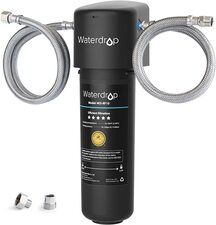
A great budget filtration system that is super simple to install and maintain.
Pros
- 3 Minutes to install
-
Lasts up to 8,000 gallons
- Quick-change cartridges
-
Enhances taste and odor through the 0.1-micron filtration power
Cons
- Low flow rate
Best Flow Rate
Viqua S2Q-P/12VDC
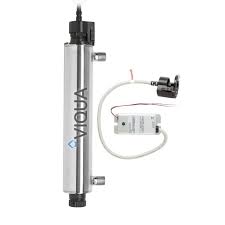
If you are serious about getting a top-of-the-line filtration system, then Viqua will suit you perfectly. It is an electrical system that ensures you and your family are not exposed to bacteria in untreated water. Viqua is an ultraviolet purification system that works on 12 volts but can also operate on batteries. Contaminants Reduced Sediments Bacteria Protozoa Certain viruses Cysts
Pros
- Works on a 12-volt electrical system
-
Compact design fits perfectly under the sink
-
Has an off-grid application design
-
LED lights show you that the unit is working
-
Can neutralize 99.99% of dangerous microorganisms
-
Includes a high-performance lamp
-
Alarm notifies you if the lamp no longer works
-
Produces high flow rates
Cons
- Water becomes hot if idle in the chamber for excessive periods
- Requires a sediment pre-filter
Best Size
Pentair FreshPoint GRO-350B
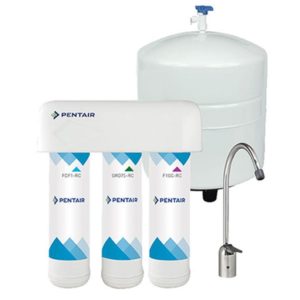
Pentair enables you to produce high-purity water. Considering that it is portable, Pentair can allow reverse osmosis units in cramped spaces. It is user-friendly to install and has a quick-change cartridge. Its GRO technology reduces the system’s waste and helps with conservation. Pentair FreshPoint GRO-350B comes fully equipped with a storage tank, faucet, and air gap. Contaminants Reduced Chemicals Chloramines Heavy metals Cysts Fluoride Lead Nitrates VOCs Salt Sediment Total dissolved solids Chlorine
Pros
- Its GRO technology is less wasteful than RO units
-
Gets rid of 96% of dissolved solids in water
-
Reduces contaminants such as fluoride and lead
-
Very compact, easily fitting under the sink
-
Easy to change the filter due to the click-to-lock cartridge
Cons
- Installation process requires more effort than other systems
-
Needs a drain connection for wastewater
-
Filter replacements are costly
Best Affordability
Camco TastePURE Inline RV Water Filter
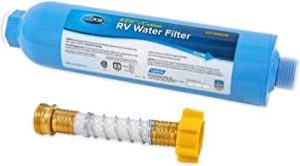
This inline filter removes chlorine odor and large sediment and is suitable for people on a strict budget. RV owners looking for a filter that can last for up to three months will find the Camco TastePURE a great option. Plus, installing it is straightforward. Contaminants Reduced Taste Odors Chlorine Sediment
Pros
- Perfect for large-capacity use
-
KDF protection gets rid of bacteria growth within the filter
-
Easy to install
-
Very affordable
Cons
- Does not remove all the bacteria in the water
-
Capable of removing particles only 20 microns and higher
How to Choose an RV Water Filter
There is an array of options when it comes to choosing a water filter. It is an essential part to get before you head out on a trip because you and your family will have to use water. Since you will need a camper water filter, how do you know which one to get?
You should consider a few factors to help you get the right water filter to meet your needs, including knowing what’s in the water you’re drinking, how much filtered water you need, how often you’ll use the filter, and how much it will cost over time.
1. Know What’s in the Water You’re Drinking
There are numerous contaminants in your RV tank. You need to know which ones are present and how to filter them. The easiest way to find out what contaminants are in your tank is by performing a water test. Keep in mind that performing water tests can be challenging when moving from one campsite to another.
Most RV campgrounds supply city water in their parks, and its supply source has used chlorine to disinfect the water and rid it of waterborne diseases. Something else to keep in mind with chlorine is that it does not have a pleasant odor and can make water taste less appealing.
The other water supply source at parks is wells, which contain heavy metals, sediments, and microorganisms. Whenever you are located somewhere with hard water, know that your tank could collect magnesium and calcium, resulting in damaged plumbing.
Not only can you put your health at risk if you do not know what is in the water that you are drinking, but you may suffer unnecessary repair or replacement costs.
2. Decide How Much Water You Need to Filter
An important aspect that you need to consider is how much water you want to filter. This key factor is going to determine which filter you buy. If you have your whole family with you in the RV, it will require you to use a lot of water. That means you’re going to have to buy a multi-canister system or an inline filter.
You also have the option to purchase a filter that is specifically designed to handle the water supply for drinking and cooking. In that case, it’s best to opt for a countertop filter or an under-sink filtration system. The issue with these options is that they will not remove contaminants from entering your appliances, but they will supply water that you can drink.
If you want to incorporate systems to clean the water, that is also possible with a whole-RV system and an under-sink system.
3. Consider How Often You’ll Use the Filter
Your choice of a water filter will also depend on the type of excursions you take. Is RVing a hobby you do once in a while or are you an enthusiast who covers extensive mileage on various terrains and sea levels? If you are serious about RVing, then you might want to look at a comprehensive filtration system.
You will not need a complex water filtering system if you use your RV only on certain occasions. Remember that you will need a system that can neutralize bacteria if your water source is a dam or a lake. At the very least, you should have carbon and sediment filters.
You cannot rely only on your RV’s past use, as you must determine how much you will use it in the future. It’s best to estimate your RV usage and then add a bit extra so that you don’t end up buying a filter that is not sufficient.
4. Calculate the Cost Over Time
By taking into account all of the above factors, you can determine how often you will have to change water filters. The different filtration systems vary in price, and installing multiple systems over time can become quite pricey. That means your budget will play a significant role in your purchase.
When comparing which system to choose, know that you need to install replacement lamps annually in a UV system. Also, the absorption capacity on a carbon filter diminishes after processing a specific amount of water.
FAQs
How long do RV water filters last?
Most filters will last you for around three months. However, you may need to replace it before then, depending on your traveling level, the number of people in the RV, and overall water-use. If you purchase a high-quality filter, it could last up to 12 months. It’s important to remember that changing a filter sooner rather than later is best. It is also helpful to note when you change the filter and set a reminder to check it before too much time has passed.
How do you store RV water filters?
You can store them wet or dry because they are not prone to stagnation or when water does not move for a prolonged time. The only thing you should ensure is that the place where you store the filters is dark and clean. All you need to do is empty the water from the canisters and fit the wet filters back into place to keep them clean. If you have CDB-KDF filters, you should store them submerged underwater.
Where is the water filter in my RV?
You will find that some water filters are connected to the line at the entrance of your RV’s tank. With others, they may be fitted under the sink. There is also the possibility that your RV has both a filter at the tank and another under the sink.
Conclusion
There are various inline water filters for RVs on the market, and we have included several types that you can choose from based on your family’s needs. Selecting the right one for your RV comes down to several factors such as your budget, how clean you want the water to be, and what contaminants you want the filter to clean.
The ones we have specified are a good combination of all the factors. Some of the water filters have more features than others, which is also reflected in their price. The great thing about choosing an RV water filter is that owners can select what parts of the RV to target.
If you want only clean water for drinking and cooking, then you can do so. Otherwise, combining two filtration systems will provide the entire family with full water capacity for all uses.
The advice on which water filter to purchase is not a one-size-fits-all approach. It depends on what it is that you need and how much you can afford. We here at the Wandering RV would love to know which water filter system you plan on buying and why, or which system you currently use and how you like it. Feel free to leave us a comment below.
Other RV Buying Guides:
- Must-Have RV Accessories, Supplies & Parts
- RV Refrigerators
- RV Air Conditioners
- RV Water Pumps
- RV Antennas
- RV Recliners
- RV Roof Coating & Sealants
- RV Leveling Blocks
- RV Batteries
- Best Portable Grills
- RV Water Filters
- RV Surge Protectors
- RV Generators
- RV Mattresses
- RV Backup Cameras
- Portable Toilets
- Portable Camp Sinks
- Camp Chairs with Canopy
- RV Covers
- RV WiFi Boosters
- The Smallest Portable Air Conditioners for RVs & Tiny Spaces
- The 5 Best RV Sewer Hoses (That Won’t Leak On You)
- 5 Best RV Sewer Hose Support Options to Avoid Accidents


